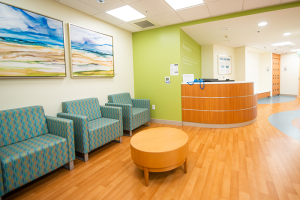Designing for aging in every environment
By 2030, 1 in 5 Americans will be over 65. As our population ages, hospitals and health care facilities must evolve to meet their needs, and age-friendly design is at the forefront of this evolution.
In the early days of evidence-based design, The Center for Health Design created an eight-step process to guide design decisions for environments frequented by aging adults. This approach prioritized safety, accessibility, cognitive support and overall well-being — key factors in senior care and living environments.
Since then, The Center has been a vocal advocate for advancing design for aging patients, residents and visitors. Our website houses abundant resources including our Impact of Aging Toolbox, which features dozens of Center-created and curated design briefs, best practices, tools, webinars, research and resources to inform design decisions in aging environments. It is currently open and can be accessed at no cost thanks to the support of Patcraft, Dalton, Ga.
You’ll also find:
- An accessible, online library of webinars and workshop sessions that focus on aging-related design features.
- Interactive design diagrams for dementia-friendly waiting rooms, health care at home, aging in place and universal design.
- The Knowledge Repository, a free searchable database of more than 6,000 research citations connecting the physical environment to health and safety outcomes.
We have investigated and documented the concept of aging in place, which focuses on designing residential environments — with best practices applicable to health care and other settings — that allow older adults to live independently and comfortably in their own homes for as long as possible.
We have also developed design guidelines for senior living that emphasize person-centered care.
Finally, we recently held the first in-person meeting of our Resilient Aging Environments Network (RAEN). It is our newest of four collegial environment networks created to bring together people from the design, health care and solution-provider industries.
It was an incredible two days. Members were open, dedicated, kind and deeply passionate about solving problems and improving people’s lives as they age. The unprecedented, behind-the-scenes access to new and experimental models of care — provided by our hosts, RAEN member Steve Lindsey, CEO of Garden Spot Village in New Holland, Pa., and his team — was as inspiring as it was educational.
For example, Garden Spot has developed unique models to provide living experiences that meet the needs of diverse populations. Its small “pocket neighborhoods” of single-family homes are creatively integrated community spaces for independent living. Garden Spot is also experimenting with a five-bedroom home for low-income seniors to share while accessing support programs. One of the more unique parts of the meeting was being welcomed into these residents’ homes to hear about their experiences firsthand.
Realizing that many couples don’t want to separate when one spouse needs to move into a dementia care unit, Garden Spot piloted a highly successful design that attached securable one-bedroom apartments to dementia care units.
We also experienced a fascinating new integration of sonic technology and memory care, developed by Composure, New York City, and the subject of a recent study by The Center’s research team, proving effective in improving sleep quality and behavior.
The RAEN network is just one opportunity available through The Center to expand your knowledge of tools and strategies supporting our aging population.
If you’re looking for a more in-depth learning experience, The Center will host our sixth annual, full-day, virtual workshop dedicated to designing environments for aging in January (see details below).
As the field continues to evolve, staying ahead of the curve is essential. Together, we can ensure our health care facilities support people of all ages.
The Design for Aging Workshop
Every environment you are planning, designing or building touches our aging population in some way, at some time. On Jan. 23, 2025, a diverse and expert faculty will lead our sixth annual Design for Aging Workshop: Innovative and Evidence-based Practices Across the Continuum of Care. They’ll share design interventions that enhance health, safety and longevity and case studies that integrate architecture, design and technology.
Join us for this high-value, high-return virtual learning experience. Health Facilities Management readers receive 50% off with the code AGE50HFM.
About this column
“From The Center” is by the leadership of The Center for Health Design and appears in alternating issues of Health Facilities Management magazine.




